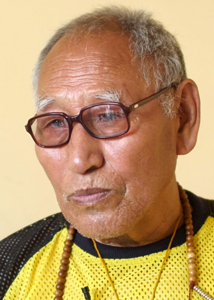Name: Dhoga
(Alias: No)
Gender: Male
Interview Age: 78
Date of Birth: 1939
Birthplace: Tiwu, Kham, Tibet
Year Left Tibet: 1959
Profession: Monk
Monk/Nun: Previously
Political Prisoner: No

Interview No.: 23U
Date: 2017-03-30
Language: Tibetan
Location: Rajpur, Uttarakhand, India
Categories: Culture and History
Keywords: childhood memories, Chinese rule -- life under, customs/traditions, farm life, food/drink, houses/villages, Kham, monastic life, refugee in India -- life as
Summary:
Dhoga was born in Tehor, Kham Province in 1939. His family grew crops and raised a small number of animals also. They lived in a large house with the animals on the lower floor, the family on the middle floor, and they used the upper floor for storing the barley crop after harvest. They also used the roof for threshing the grain.
Dhoga's family co-owned the water mill in his village, which was used by all the villagers to grind barley into tsampa 'flour made from roasted barley.' Nomads came to the village each year to barter dairy products for barley. Dhoga describes the nomads' methods of slaughtering animals for meat.
Hoping for a happier life, Dhoga chose to become a monk and joined the local monastery. Tradition dictated that each monk study for a three years in one of the great monasteries in Lhasa. When Dhoga was threatened by the Chinese to join their army, he quickly left to join Sera Monastery in Lhasa around 1957. He was unable to complete his three years of study because the Chinese seized Lhasa in 1959. Dhoga briefly joined the Chushi Gangdrug [Defend Tibet Volunteer Force] during his escape. After arriving in India, he relocated several times before joining the Indian Army, which he served for 24 years.
Interview Team:
- Marcella Adamski (Interviewer)
- Tenzin Yangchen (Interpreter)
- Tenzin Choenyi (Videographer)

